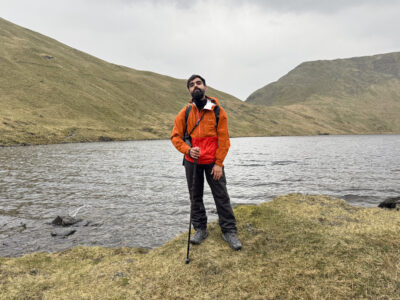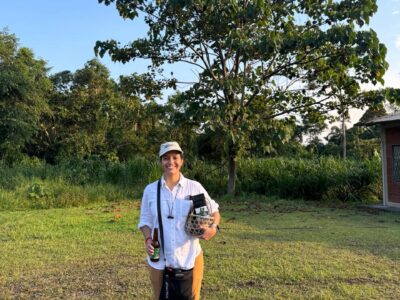Joe Katz is a student who knows where he is heading. When he finishes his studies in the intensive 12-month interdisciplinary Master of Public Administration in Environmental Science and Policy program (M.P.A. E.S.P.), which is jointly administered by the Earth Institute and the School of International and Public Affairs (SIPA), he plans to return to the United States Army. He has already served 11 years in active duty, including a 15-month deployment to Iraq, and after graduating, he hopes to play a role in insuring that environmental concerns play a greater role in American military policy and planning.
“Understanding that our primary mission is defending the nation, it still sometimes means subjugating environmental concerns in favor or more effective strategies and tactics. However, I also feel that there are many day-to-day operations and even large-scale homeland operations that can be done in a more environmentally friendly manner that can actually save taxpayers money and improve public health without compromising security.”
It was during Joe’s duty in Iraq that he made the decision to apply to the program at Columbia. “My background has been in the actual implementation of government policy rather than its development. However, having had considerable access to observing both the environmental and policy-making sectors in action I felt I had something to contribute to their success, and came to SIPA to learn the best way to do that.”
Joe’s unit was detailed with rooting out Al Qaeda terrorists who were attempting to do strategic damage to the economically valuable and vulnerable crude oil pipelines running just feet below the ground. “In the process of carrying out my mission, I had a firsthand look at not only how our nation’s energy policy was having detrimental consequences to our own national security, but also the devastating effects that our dependence on fossil fuels was having on the world’s environment.”
The M.P.A. E.S.P. program is designed to have an applied focus in order to prepare individuals for leadership positions in local, state and federal government agencies, as well as in nonprofit organizations and the environmental divisions of private corporations. Students develop the practical skills necessary to understand the formulation and management of environment and sustainable development public policy. The principal goal of the core curriculum is to provide students with the analytic, communication and work skills required to be problem-solving earth systems professionals. To that end, students are taught specific professional and vocational skills, such as memo writing, oral briefings, group process and team building, leadership, strategic thinking, creating spreadsheets and other forms of financial analysis, the use of computer programs, analysis of case studies of earth systems issues, and issues concerning the Internet.
For Joe, the strength of the program lies in its students. “The best part of the program for me has been working with and learning from the tremendously talented and diverse group of students enrolled in the program. Many of our courses are group oriented, and this has allowed me to not only bring my own expertise to the work, but learn from others as well. It’s been tremendously rewarding to make such great friends who will be positively influencing the world in the future. “
Graduates of the program now work in a wide range of public and private agencies in the United States and abroad, including Region 2 of the Environmental Protection Agency; U.S. Department of Energy, Office of Energy Efficiency and Renewable Energy; Environmental Policy Office in Ireland; The City of New York, Department of Health and Mental Hygiene; Booz Allen Hamilton; Cadmus Group; Malcolm Pirnie; ICF International; Environmental Defense; Environmental Insurance Agency; CLF Ventures, Inc; The Consortium for Energy Efficiency; Women and Girls Empowerment Program; and Arizona State University, School of Life Sciences.
When Joe returns to the Army, he will go back with a different perspective. “It seems that any policy implementation, environmental or otherwise, is often a slow and arduous process with inherent compromise. That said, by targeting public values in a way that people not only understand but appreciate, I feel we can affect positive environmental change for the people of this world. I am more enthusiastic and positive about influencing the future than I have ever been before.”



